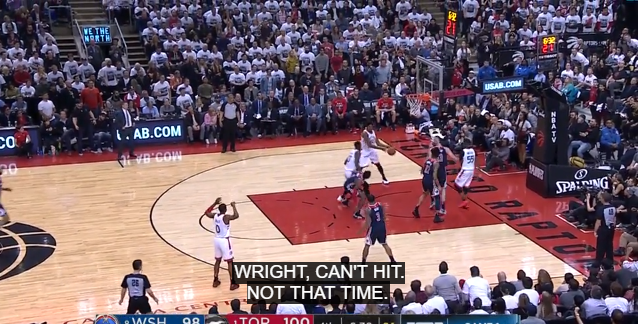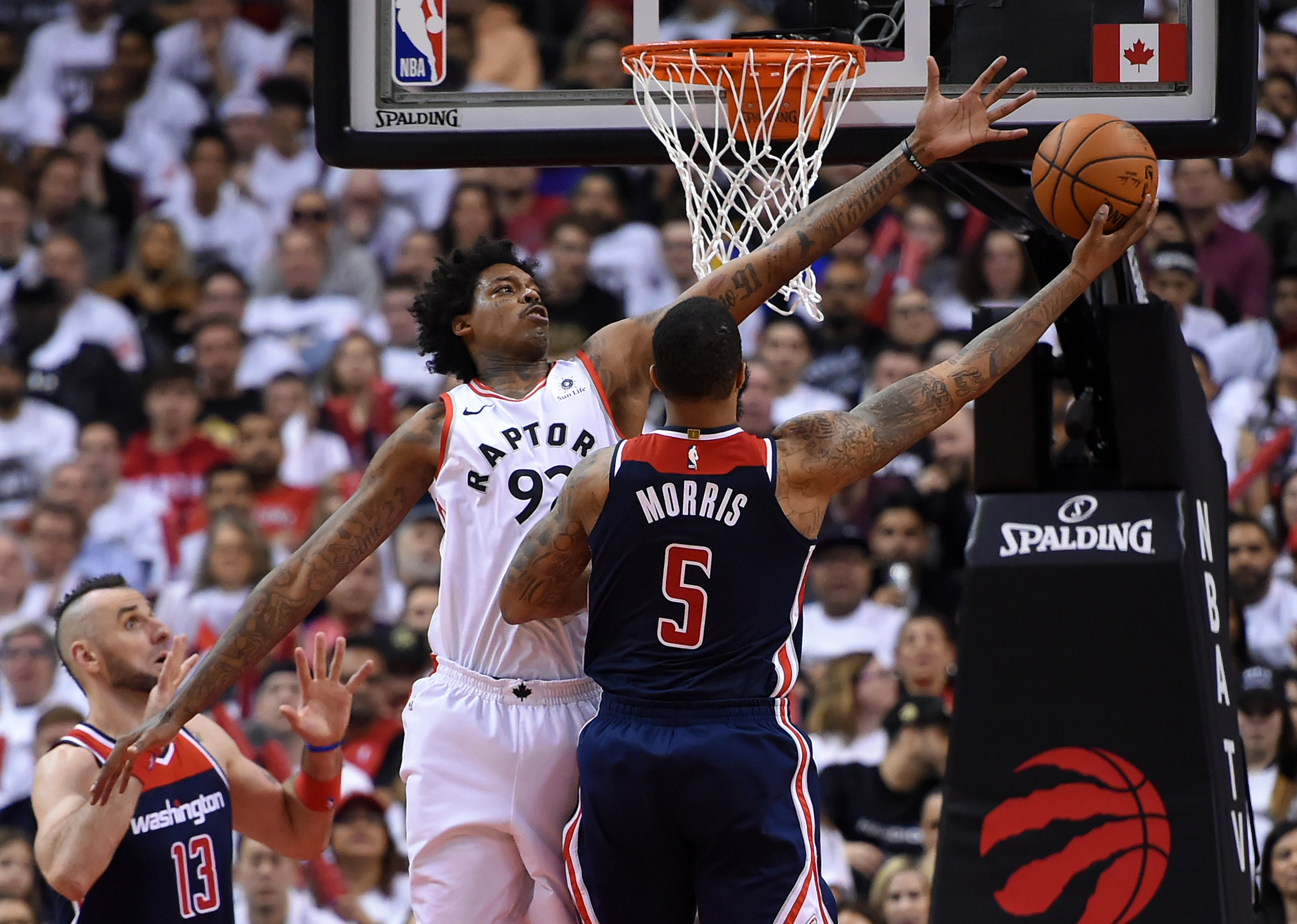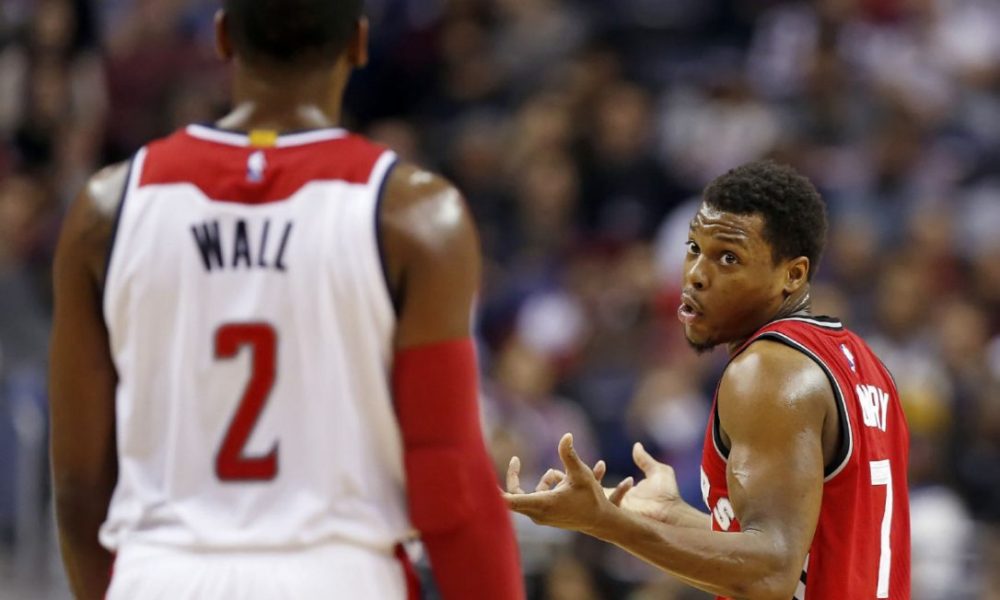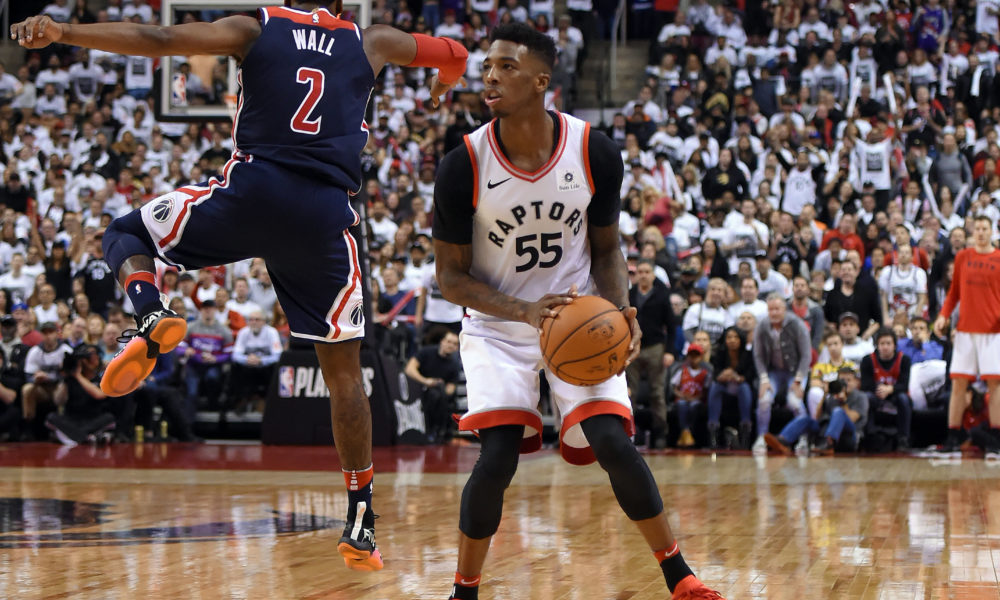The energy in the Air Canada Centre has spent the last few minutes rising to a crescendo. A missed Pascal Siakam three has little time to transition the crowd into their customary de-fense chant, as Delon Wright pokes the ensuing defensive rebound free, Kyle Lowry jumps on the fumble, and Wright eventually finds Lucas Nogueira under the basket. The ACC is ready to burst – the Raptors are up two, Nogueira has already provided a spark in the pivotal fourth quarter of Game 1, and the 7-footer has what appears to be a clean look at a dunk.
Instead, Nogueira instinctively swings the ball to the top of the arc, finding C.J. Miles. The decision causes a momentary hush. In real-time, it looks as if Nogueira doesn’t even think about scoring. Wright is yelling “dunk,” but Nogueira scarcely looks at the rim before looking for the shooter. The crowd seems almost dumbfounded until Miles nails the three, sending the Wizards to a timeout.
This is the most Nogueira play of all time. The selfless Brazilian passing up a good look at a two for a great look at a three, the sort of play that perfectly defines his philosophical approach to offensive basketball. A Nogueira shot at the rim has an expected point value of about half a point more than a Miles catch-and-shoot three, but three is more than two, and Miles is a world-class shooter. Plus, Nogueira’s look at the rim comes with risk he evaluates in an instant. Marcin Gortat is in position to potentially foul him to prevent the dunk, and Nogueira is not a great free-throw shooter. Kelly Oubre and John Wall are both within distance to try to rack his hands for a steal, and Toronto has three players deep below the free-throw line.
“Lucas doesn’t look at the rim unless it’s a lob,” Miles says. “I had my feet set when I saw it go to him. We’ve been screaming at him all year about looking at the rim. I guess you know a guy’s habits. I was just trying to stay ready.”
Mostly, though, it’s Miles. Nogueira’s attempt may have a higher expected value, but three is more than two, in score and for momentum purposes, and Nogueira can’t help playing this way. He will always look not for a good shot but the best shot, and often times that means sacrificing his own look. He’s aware of how such decisions look, but he can’t help but to make what he feels is the right play.
“I know sometimes I have the opportunity to score but I always find a better opportunity to score, you know?” he says. “C.J., I’m always looking for him because he’s a great shooter. Even if he misses, I don’t think it was a bad pass. It’s hard, but I understand. I used to be a fan, too, and I’m still a fan of basketball or soccer teams, so I understand how fans feel. I saw the crowd like almost cursing me, but when he hit the shot, everybody was happy.”
And everybody was happy. It was A Moment, and the Raptors never looked back over the final six minutes.
—
The notion of Nogueira being aware of the happiness of others comes up often, and his sort of sacrificial utilitarian approach to offensive possessions reflects how he treats his position on the Raptors. No matter his role on a given day, a victory provides the greatest utility to everyone involved. Some days, that means playing the role of high-emoting cheerleader from the bench. Others, it means swinging a playoff game without touching the box score.
“It doesn’t matter how many numbers you put it at the end of the day, if you don’t win, it doesn’t matter,” he says. “Everybody wins and everybody loses. Yesterday was one point, one rebound, but to me the most important thing was the W. This is what I’m looking for every time. Some nights, you’re gonna score a little bit more points, grab a couple more rebounds, but I’m so happy to grab no rebounds, score no points, and win the game.”
Nogueira thinks like this regardless, which helps since his role necessitates that kind of attitude. For four years now, Nogueira has been the team’s third center, called on only sparingly. He is the Raptors’ knuckle-baller, a change-of-pace center who does things so few others can do and disrupts the flow of opposing offenses and defenses. There are few rim protectors as long as Nogueira in contest mode, few lob threats as easy to hit on the roll, and few players blending the ability to set great screens and make the proper reads in the 4-on-3s that result from the aggressive traps the Raptors see consistently. Every time the Raptors call on him in non-garbage time, he delivers. Nogueira is quite good, and on any other team in the NBA, he’s playing a huge role. The Raptors, though, run 12-deep and have maybe the deepest center rotation in basketball.
He knows how good he is, and so do the Raptors. There’s a reason Dwane Casey didn’t hesitate to play him nine minutes in a playoff game, all of them in the fourth quarter, and why Kyle Lowry lights up when Nogueira checks in.
“Is that a trick question?” Casey says when asked if he’s ever coached someone like Nogueira. “He’s unique, he’s very unique. A seven-footer, very smart, very personable. High basketball IQ, very personable as you guys know and a great feel for the game. It’s unusual his feel for the game. His passing is unbelievable, to make foul shots. He’s very unique from that standpoint. He’s a wild card. He’s a luxury…You trust Lucas”
But this is not the easiest position to exist in. Sitting and waiting can be difficult, and Nogueira is human. Profoundly so. Few players seem to possess the empathy for teammates and fans alike that Nogueira has, and few seem as willing to take the happiness of others as a reasonable reward for their own struggles. He is open about the ups and downs he’s gone through, not only as a basketball player but as a person. On Sunday, he didn’t seem particularly pleased with his own performance, instead drawing pleasure from how his game-changing performance affected those around him.
“I get happy from my friends, my teammates, I get happy for the city, the fans,” he says. “To me, I’m a very team player, so the win is the most important thing for me. ‘Cause when the team wins, everybody’s happy, and I like to see people happy even if I’m not.”
Were happiness provided per-possession a stat, Nogueira’s would be as robust as his net rating.
—
Being called on sporadically to make an out-sized impact is not something every player can be relied on to do. Nogueira’s done it consistently enough now that it’s a pretty established skill he possesses, and perhaps the lack of concern for his own numbers helps. Nogueira is process-oriented and has enough experience that he understands variance in performance, which can help balance out some of the urgency that depth players feel to make the most of limited opportunities.
“It’s hard to go in there and perform when you’re not getting solid minutes in the season and you might not play in the whole quarter or the whole game. But you have to perform. Sometimes this is your only chance. You’ve got to find a way to play well,” he says. “I think I’m always ready, but sometimes the game just didn’t work well. I think everybody’s ready, every time, I think the whole team is ready, but some days it’s not your night. Some days the shot doesn’t fall or you don’t block that shot that you always block, or something happens and things don’t go well. But I think mentally, I’m always ready to play. Some days, some nights things happen like yesterday, I could change the game a little bit and bring the win to the team.”
Nogueira sees two things as helping him come in and perform on short notice. The first is that coming off of the bench allows him to sit and feel out the game, noticing opponent tendencies or how different things are working or failing. A starter doesn’t have that benefit, and by the time he’s called on, Nogueira at least knows what he can do to change the game. The other is that, “I’m not afraid, I’m never afraid.” Nogueira cares little for who he’s put up against or when, and his quiet faith in his own experience allows him to ignore the leverage and pressure of any situation and just play.
Even if that situation is the fourth quarter of a playoff game he had no expectation of playing in.
“No. No. Fourth quarter, playoffs? No. To be honest, I wasn’t expecting to play. I’m always ready to play but I wasn’t expecting to play,” he says. “I never know. You know me, probably watching me. I’m always there sitting on the bench, drinking coconut water and watch the game. Some days, they say, ‘Lucas, go ahead,’ and I just go and play…And I’m so glad that Casey can trust in 11 guys. I hope he can trust even more guys. At the end of the day, it’s team basketball, it’s not one or two guys gonna win. Everybody needs to help each other and bring the results every time.”
On Saturday, Nogueira wound up playing just over nine minutes, playing to a plus-8. He helped swing the team’s first ever Game 1 win at home and take control of what should be a tough first-round series against the Wizards. There’s no indication as to whether he will or won’t play in Game 2 on Tuesday, and he’s prepared to do what he always does, sipping his coconut water and waiting for the call.
It’s not an easy role to play, and few play it as well as Nogueira. When he almost inevitably provides another boost in a big moment again, it won’t be his own stats or even his own enjoyment he’s looking to produce. Instead, it will be the excited look on the face of Miles after a three, of Casey after a block, or of Lowry after a high-arcing lob that rewards Nogueira, the NBA’s selfless, 7-foot philosopher king.
“Yeah, it’s nice to see in his eyes,” Nogueira says. “And not only his eyes, but everybody’s eyes. They trust me, and they’re happy because I’m performing well. I like to see those things, too.”




